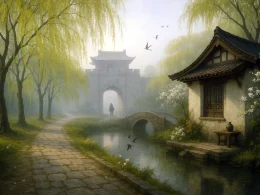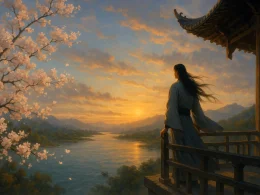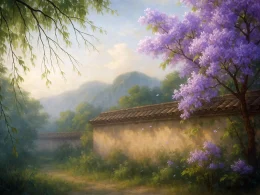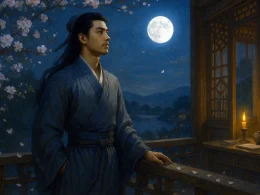High beyond the thick wall a tower shines with sunset
Where peach and plum are blooming and the willowcotton flies.
You have heard in your office the court-bell of twilight;
Birds find perches, officials head for home.
Your morning-jade will tinkle as you thread the golden palace;
You will bring the word of Heaven from the closing gates at night.
And I should serve there with you; but being full of years,
I have taken off official robes and am resting from my troubles.
Original Poem
「赠郭给事」
王维
洞门高阁霭余辉,桃李阴阴柳絮飞。
禁里疏钟官舍晚,省中啼鸟吏人稀。
晨摇玉佩趋金殿,夕奉天书拜琐闱。
强欲从君无那老,将因卧病解朝衣。
Interpretation
This is a late-life masterpiece of Wang Wei's palace-style poetry, composed during his tenure as Assistant Director of the Right in the Department of State Affairs, a period when his state of mind had grown lucid and detached. The poem is dedicated to a friend, surnamed Guo, who at the time served as Supervising Censor in the Chancellery. While ostensibly adhering to the elegant conventions of occasional court poetry, it intricately weaves together expectations for his friend, observations on the court, and deep reflection on his own life. With his unique fusion of poetic and painterly techniques and his subtle, profound lyrical artistry, Wang Wei elevates a piece that could easily have lapsed into formulaic social verse into a refined text that offers a glimpse into the spiritual world and the philosophy of engagement and withdrawal among the scholar-officials of the High Tang.
First Couplet: 洞门高阁霭余晖,桃李阴阴柳絮飞。
Dòng mén gāo gé ǎi yúhuī, táo lǐ yīn yīn liǔxù fēi.
Layered palace gates and lofty halls bask in the lingering sunset’s glow;
Peach and plum cast deep shadows, willow-down wafts in gentle winds that blow.
The opening establishes the poem's tone with a scene of opulent yet serene twilight. "Layered palace gates and lofty halls" symbolize the grandeur of the seat of power, while "bask in the lingering sunset’s glow" sanctifies them with a warm, radiant halo, subtly implying the emperor's widespread benevolence and a harmonious, well-ordered governance. "Peach and plum cast deep shadows" is a phrase rich with double meaning: it literally depicts the lush spring scenery, but more importantly, it alludes to the idiom "peaches and plums fill the world" (taoli mantianxia), praising Censor Guo for having students and protégés throughout the court, his influence far-reaching. "Willow-down wafts", with its imagery of light, drifting floss, metaphorically suggests the flourishing success and spreading influence of the talented individuals under his patronage. This couplet contains praise within its scenery, yet expresses it through natural imagery, achieving a dignified beauty that remains fresh, solemn yet implicitly vibrant, fully displaying Wang Wei's supreme skill in "offering praise through painting."
Second Couplet: 禁里疏钟官舍晚,省中啼鸟吏人稀。
Jìn lǐ shū zhōng guān shě wǎn, shěng zhōng tí niǎo lì rén xī.
Within the palace grounds, the evening bell tolls slow and spare;
In the Chancellery court, birds sing, and clerks are seldom seen there.
This couplet shifts the scene from outside to inside, using details like the "slow and spare" evening bell and singing birds to depict an idealized vision of bureaucracy characterized by simplified governance and settled disputes, bringing peace to the people. "Slow" and "spare" are the poetic kernels: the slow tolling of the bell suggests unhurried time, with no urgent state affairs pressing; the sparseness of clerks indicates uncluttered paperwork, with punishments rare and administration streamlined. The fact that birds dare to sing within this crucial, powerful place uses sound to emphasize stillness, contrasting to highlight the dignity and harmony of the government offices. This is both an implicit commendation of Censor Guo's upright, prudent, diligent, and capable administration, and a projection of Wang Wei's own yearning for the political ideal of "ruling with effortless grace" (chuigong erzhi).
Third Couplet: 晨摇玉佩趋金殿,夕奉天书拜琐闱。
Chén yáo yùpèi qū jīn diàn, xī fèng tiān shū bài suǒ wéi.
At dawn, his jade pendants chime, hastening to the Golden Hall’s levee;
At dusk, imperial edicts in hand, he bows farewell at the palace’s portal, gravely.
This couplet, with its parallel structure and ritualistic imagery, sketches Censor Guo’s daily routine as a close courtier. The antithesis of "At dawn" and "At dusk" encompasses his diligence from morning till night. "Jade pendants chime" and "imperial edicts in hand" employ auditory and visual details to showcase his honored status and weighty responsibilities. The two verbs, "hastening" and "bows farewell", are precise and vivid, capturing both the solemnity of court ritual and the reverent, loyal demeanor of a minister. Through narration, this couplet completes the portrait, bringing to life a trusted pillar of the state, steadfast in his duties.
Fourth Couplet: 强欲从君无那老,将因卧病解朝衣。
Qiáng yù cóng jūn wú nà lǎo, jiāng yīn wò bìng jiě cháo yī.
Though I strongly wish to follow you, I cannot defy these aging years;
And soon, pleading illness, I shall lay aside the court robes I’ve worn.
The final couplet turns abruptly, shifting from praising the friend to sighing over the self, becoming the poem's emotional center of gravity. The two words "strongly wish" are saturated with struggle and reluctance, revealing the poet’s inner lingering warmth and attachment to political life. "I cannot defy these aging years" is a heavy sigh, acknowledging human powerlessness before natural law. "Pleading illness" is a manifestation of physical frailty and the most dignified pretext for withdrawing from court; "lay aside the court robes" is the poetic expression of this decision, symbolizing the final farewell to his bureaucratic identity. Beneath the surface of humble concession, this couplet contains a complex mix of life’s emotions: melancholy for passing years, well-wishes for a friend’s future, and also a recognition and movement towards another possibility for his own life (withdrawal into reclusion).
Holistic Appreciation
This is a deeply lyrical poem that conducts a multi-layered dialogue within the framework of a dedicatory verse. Its structure is rigorous, yet the flow of emotion is richly layered: the first two couplets use scenery to imply praise, outlining the era’s backdrop of imperial magnanimity and harmonious governance, and the friend’s honored position. The third couplet uses action to portray the person, focusing on the friend’s image of diligent service. Finally, the last couplet turns the brush back, pouring out the poet’s own intention to depart, creating a sharp contrast and emotional tension between "praising the other" and "speaking of the self."
Wang Wei’s brilliance lies in placing his personal choice of engagement or withdrawal within a grand and beautiful public tableau for display. He praises the clear, well-governed world of "peaches and plums cast deep shadows" and "clerks are seldom seen" in which Censor Guo resides, and admires the loyal, diligent life of "hastening at dawn" and "bowing at dusk." Yet this does not hinder him from making the private choice to "lay aside the court robes." This indicates that his withdrawal is not a negation of political value, but a rational adjustment based on his individual life stage ("aging," "illness") and an ultimate turning towards another life value (nature, the inner self). This stance of "harmony but not uniformity" reflects the tolerance and maturity of the High Tang scholar-official’s spiritual world.
Artistic Merits
- Exquisite Construction of a Symbolic System: The entire poem forms a complete symbolic system. "Layered palace gates and lofty halls" symbolize the seat of power; "peach and plum" symbolize the protégés and achievements; "willow-down" symbolizes influence; "slow bell" and "singing birds" symbolize simplified governance and few punishments; "jade pendants" and "imperial edicts" symbolize imperial favor and duty; "court robes" symbolize bureaucratic identity. These symbols interconnect, jointly constructing a poetic world rich in meaning.
- Aesthetic of the Official Compound through Interwoven Senses: The poem is full of exquisite pairings of sound and image: the lingering sunset glow with peach and plum (sight), drifting willow-down (sight and kinetic sense), the slow bell (sound), singing birds (sound), chiming jade pendants (sound), bowing at the palace portal (visual ritual). These sensory descriptions aestheticize and poeticize the solemn life of the court, transcending the dryness of ordinary occasional verse.
- Emotional Deepening through Contrast: The poem employs multiple layers of contrast: the "praising the other" of the first six lines versus the "speaking of the self" of the final couplet; the busyness of "hastening at dawn, bowing at dusk" versus the leisure of "lay aside the court robes"; the flourishing abundance of "peach and plum cast deep shadows" versus the poet’s own "aging years" and "illness." These contrasts, far from seeming disjointed, unify within opposition, deepening the poem’s emotional complexity and intellectual depth.
- Elegant Diction with Latent Tension: The poem’s language is elegant and dignified, fitting for the occasion of a palace-style dedication, yet without a sense of forced ornamentation. Especially in the final couplet, the use of function words like "strongly wish," "cannot defy," and "soon, pleading" subtly expresses the heart’s sentiments, containing immense life-weariness within a tone of humble concession, where words end but meaning continues endlessly.
Insights
This work transcends ordinary social verse, presenting to us a case of highly conscious life planning and value choice. In Wang Wei’s time, pursuing an official career or withdrawing into reclusion was the core dilemma facing scholars. This poem reveals that true wisdom does not lie in stubbornly clinging to one end, but in a clear awareness of one’s own life stage and genuine inner needs, and in making the choice of "advance" or "withdrawal" that accords with one’s true heart at the appropriate time.
For the modern reader, this poem inspires reflection on the relationship between career ("court robes") and life ("aging years," "illness"), and between social role and the inner self. We may have all "strongly wish[ed] to follow" someone or something, desiring to achieve in our careers; but we also need to heed the natural call of "cannot defy these aging years," and understand that when body and mind require it, we must have the courage to "lay aside" the constraints of a certain social identity to pursue a life state closer to authenticity. Wang Wei’s act of "lay[ing] aside the court robes" is not passive escape, but an active turn, an exploration and homage to another realm of life.
This poem is a blessing and a farewell spoken by a wise man, crossing a thousand years in the lingering sunset glow, to a diligent friend. It is also an ancient invitation concerning freedom and composure, extended to all future souls wavering between "advancement" and "withdrawal."
Poem translator
Kiang Kanghu
About the poet

Wang Wei (王维), 701 - 761 A.D., was a native of Yuncheng, Shanxi Province. Wang Wei was a poet of landscape and idylls. His poems of landscape and idylls, with far-reaching images and mysterious meanings, were widely loved by readers in later generations, but Wang Wei never really became a man of landscape and idylls.












